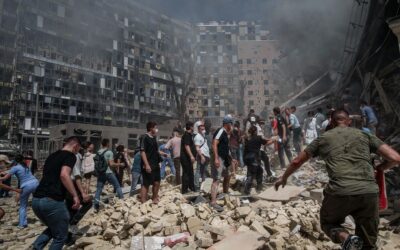The gospel message can become a “transforming and humanizing force in crisis situations”. This was the witness of Bishops at the world-wide meeting at the Centro Mariapoli, Rocca di Papa, from Sunday February 24 until Friday February 29. Around 90 bishops and cardinals from 42 different countries took part in the thirty second international meeting of Bishops, Friends of the Focolare Movement, which had as its theme, “The Word is alive: people, environments and structures are transformed”. Last Wednesday, a widely representative group of Bishops spoke at a press conference at the headquarters of the Italian Press Association. In the words of Cardinal Ennio Antonelli, Archbishop of Florence, “we have seen in the many testimonies how the Word renews family life, young people, parishes, with a deep renewal in communion.” “We have been strengthened in our conviction that the witness of the Word of God, listened to, lived and incarnated in life, and the sharing of experiences based on the Word, is a very important method of evangelisation today.” “People do not want merely to hear about Jesus, they want to see him”, as John Paul II wrote in Novo Millennio Ineunte, “and the movements, in a way, enable people to see him, to come into contact with the presence of the Lord, and the power of his Word that creates new life”. The contribution of Mons Alberto Taveira Correa, Archbishop of Palmas (Brazil) emphasised the importance of dialogue and the sects, stressing that this, “requires a dual commitment: to form individual Christians in the life of the Gospel, and to build relationships with the people who belong to these groups, trying to start a dialogue”. The emeritus bishop of Bamenda (Cameroon), Mons Paul Verzekov, witnessed to the commitment of the Church in difficult reconciliation processes, where “in four countries (Togo, Benin, Congo and the Democratic Republic of Congo), at the request of the people, and with the approval of the Holy See, the national commissions for mediation and reconciliation are presided over by Catholic bishops, with no threat to the government’s role”. He mentioned the peacemaking actions of movements and communities, like the community of Saint Egidio in Mozambique, and the actions of the Focolare Movement throughout the continent, thanks to “their commitment to live the Gospel in daily life”. As an example he spoke about the huge evangelising action of the tribal chiefs in Fontem and other villages, the involvement of the people, and the fruits of reconciliation and peaceful life together that are evident in these parts of his country. Speaking about the serious political and religious situation in Lebanon, the Maronite bishop of Baalbek, Simon Atallah, said that “while previously young people believed that armed struggle was the only hope for our country, now both Christians and Muslims are finding strength above all in religion. They have seen that there is hope neither in arms nor in politics.”. “It is important”, he said, “to read events, with the people, in the light of the Word, and find in religion love for others, rather than hatred”. Then he spoke of the rediscovery of the Gospel and the Koran, of meetings of young people from both religions, and mentioned the “Expectations of youth” movement that brings Christians and Muslims together in gatherings of over 1000. “They read the words of the Gospel and the Koran about solidarity, fraternity, and love for others.” The Archbishop of Delhi, Mons Vincent Michael Concessao, spoke about the increasing persecution of Christians in India, particularly in Orissa, stating, “we must blame not the Hindus, but the violent factions that are present in all religions. Unfortunately the political parties are using religion and these groups for their own purposes”. “This is an obstacle to conversions, because people believe they result from force or from bribery”, he went on. ”We have discussed this problem in the Bishop’s conference and are studying how to respond”. “In this context, the participation in this meeting of Bishops has strengthened me in my belief that love is the answer to everything, it is the most powerful force, because it is a sharing in the life itself of God, which is love”. And “these atrocities committed against Christians are a new opportunity to witness Christian love, love for our enemies.” Cardinal Vlk, Arhbishop of Prague and moderator of the meeting, also spoke about hope. “For me, these meetings are a reinforcement of hope, they open up a world-wide vision where we can already glimpse the things spoken about in the book of Revelation, “Behold, I make all things new. The shoots are already appearing, can you not see them?” The Cardinal testified to this hope, by speaking of the years after 1952, when after secondary school all roads were closed to him because he did not belong to the Communist party. He was given light by the Word, “Submit to the mighty hand of God, that he may exalt you in good time”. After that, many doors opened for him. “The word of God is always fulfilled. This is my great hope, it is a certainty that has been with me all my life”, he concluded. (ZENIT February 28, 2008)
Love gives meaning to everything
Love gives meaning to everything




0 Comments